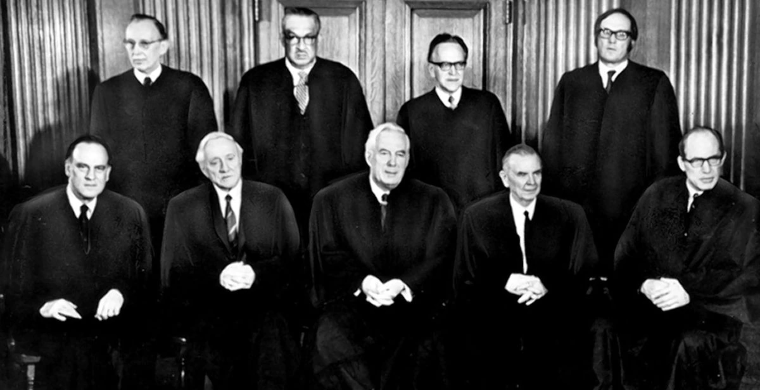A Reflection on Roe v. Wade
By David G. Duggan ©
Special to Virtueonline
www.virtueonline.org
May 5, 2022
I was in Washington DC on Monday, January 22, 1973 when the Supreme Court decided Roe v. Wade. Richard Nixon had been sworn in for his second term the prior Saturday. I was an intern with the Medill News Service, a program of Northwestern's Medill School of Journalism and I read the story about the case written by another intern. He was not a lawyer (he was an Air Force veteran as I recall) and I don't know if he ever went to law school as several of my J-school classmates and I later did. But I recall that his story was as unintelligible as the Supreme Court's opinion.
The author of the opinion, Harry Blackmun, had been the general counsel of the Mayo Clinic in Minnesota. His 2d grade classmate, chief justice Warren Burger assigned him to write the opinion but according to the folklore that has emerged, William Brennan, the only Roman Catholic justice then on the Court, was the brains behind the decision: selling the six other justices in the 7-2 majority on the medieval notion of the "quickening" of a fetus. That led to the "trimester" approach to abortion regulation. Within the first trimester or 13 weeks of a pregnancy, the state had no interest in regulating whether a woman could terminate her pregnancy under the notion that any such restriction was an invasion of her right to privacy--and the privacy of a patient's relationship with her doctor--nowhere provided in the Constitution. Within the second trimester, after the fetus had "quickened," the state had a legitimate interest in providing for the safety of the mother and could regulate how abortions were performed. In the third trimester, when the fetus was supposedly viable outside the womb, the state could regulate to the point of prohibiting abortions.
Quite apart from the anomalies of a court of law enshrining medieval notions of a fetus' life inside the womb, and calcifying 1973 medical technology, the opinion had no basis in constitutional law. The Supreme Court had abandoned the notion of "substantive due process" more than 30 years earlier when it upheld FDR's New Deal legislation. Substantive due process was the doctrine by which the Supreme Court ruled a statute unconstitutional because its substance (such as limiting a worker's hours) violated a citizen's "due process" right to work as long as he wanted. Finding a "due process" right to privacy, the Court ruled that states had limited authority to regulate abortion and unleashed a half-century of division in the courts, the legislatures and the streets.
For the last 49 years, abortion has been the dividing line for all political battles in the United States, national, state and local. Democrats can no longer be pro-life (or anti-abortion) and expect to be nominated. Republicans can skirt the issue but only so far. I myself would never vote for a candidate who supports unrestricted abortion and at best I will hold my nose if there is no ardent pro-life candidate and vote for the lesser of the evils.
For the first 70 years of the Republic, the Supreme Court avoided the issue of slavery. Fugitive slaves had no chance to have their cases pleading for their freedom heard in a federal court. In 1857 the Supremes decided Dred Scott, holding that blacks, no matter slave or free, had no rights that could be heard in federal court and unleashed the forces that led to the Civil War. We may not have had a civil war since 1973 but the conflict has still led to the death of more than 60 million lives in the womb. Will reversal of that decision cause a comparable body count?
David Duggan is a retired attorney living in Chicago. He is an occasional columnist for Virtueonline














